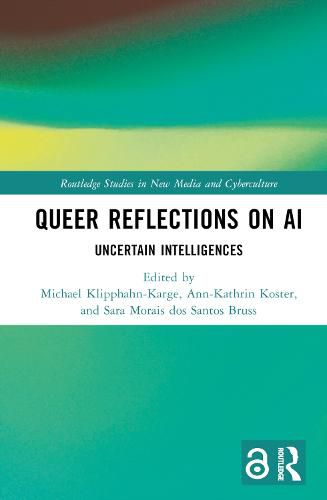Readings Newsletter
Become a Readings Member to make your shopping experience even easier.
Sign in or sign up for free!
You’re not far away from qualifying for FREE standard shipping within Australia
You’ve qualified for FREE standard shipping within Australia
The cart is loading…






This volume offers a socio-technical exploration of Artificial Intelligence (AI) and the way it reflects and reproduces certain normative representations of gender and sexuality, to ultimately guide more diverse and radical discussions of life with digital technologies.
Moving beyond the examination of empirical examples and technical solutions, the book approaches the relationship between queerness and AI from a theoretical perspective that posits queer theory as central to understanding AI differently. The chapters pose questions about the politics and ethics of machine embodiments and data imaginaries on the one hand, and about technical possibilities for a production of social identities characterised by shifting diversity and multiplicity on the other, as they are mediated by and through digital technologies.
Transgressing disciplinary boundaries to engage a diversity of conceptual tools, critical approaches, and theoretical traditions, this book will be an important resource for students and researchers of gender and sexuality, new media and digital cultures, cultural theory, art and visual culture, and AI.
The Open Access version of this book, available at http://www.taylorfrancis.com, has been made available under a Creative Commons Attribution (CC-BY) 4.0 license.
$9.00 standard shipping within Australia
FREE standard shipping within Australia for orders over $100.00
Express & International shipping calculated at checkout
This volume offers a socio-technical exploration of Artificial Intelligence (AI) and the way it reflects and reproduces certain normative representations of gender and sexuality, to ultimately guide more diverse and radical discussions of life with digital technologies.
Moving beyond the examination of empirical examples and technical solutions, the book approaches the relationship between queerness and AI from a theoretical perspective that posits queer theory as central to understanding AI differently. The chapters pose questions about the politics and ethics of machine embodiments and data imaginaries on the one hand, and about technical possibilities for a production of social identities characterised by shifting diversity and multiplicity on the other, as they are mediated by and through digital technologies.
Transgressing disciplinary boundaries to engage a diversity of conceptual tools, critical approaches, and theoretical traditions, this book will be an important resource for students and researchers of gender and sexuality, new media and digital cultures, cultural theory, art and visual culture, and AI.
The Open Access version of this book, available at http://www.taylorfrancis.com, has been made available under a Creative Commons Attribution (CC-BY) 4.0 license.